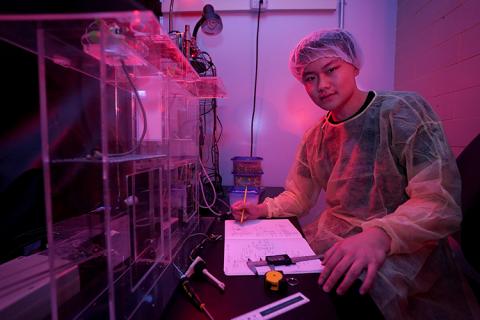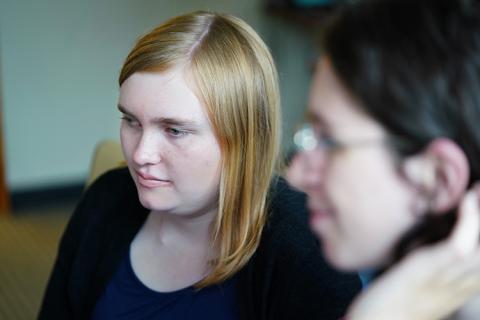Students in the CNT’s Young Scholar’s Program receive an immersive introduction to neural engineering and are equipped with skills they will need for success in science, technology, engineering and mathematics.
The Center for Neurotechnology (CNT) is a leader in the field of neural engineering. Its Young Scholars Program (YSP) enables high school students to contribute to this academic discipline by working on a seven-week summer research project in CNT-affiliated labs at the University of Washington (UW).
“Many, if not all, students are coming from places where neural engineering isn’t offered,” said Eric Chudler, executive director and education director of the CNT and a research associate professor in the UW Department of Bioengineering. “Biology may be offered with a little bit of neuroscience. Engineering might be offered, but neural engineering is quite new. To offer a program about neural engineering to high school students is unique to the UW.”
Equipping high school students with the skills to achieve success in STEM
Most of the students are recruited from the CNT’s partner high schools through STEMSub (Math Science Upward Bound) and Disabilities, Opportunities, Internetworking, and Technology. The YSP students are often upperclassmen in high school with strong interests in pursuing science, technology, engineering and mathematics (STEM) in college.
“The research project gives them insight into how research is done at a university. They own a project and have deliverables,” said Janis Wignall, pre-college education manager at the CNT. “Many of them have not been on a college campus or met a scientist, so it broadens their STEM capabilities.”
Justin Wu, a senior at Saratoga High School, became interested in the CNT’s research after participating in YSP-REACH, a one-week boot camp for high school students who are interested in neural engineering. While in the program, he toured labs on the UW campus and met researchers like CNT Co-Director, Chet Moritz. Wu was drawn to the possibility of improving the quality of life for people who have experienced spinal cord injuries.
“My uncle had a spinal cord injury, and he’s immobilized in a wheelchair. When I visited Dr. Moritz’s lab, I saw that they were pioneers in the field and helping paralyzed patients have motor movement again,” Wu said. “I was amazed by his work, and I was hoping that I could contribute and help people like my uncle.”
Over the summer as a YSP participant, Wu conducted research in Moritz’ Restorative Technologies Laboratory, and he acquired new skills in data analysis along the way. To prepare for this experience, Wu took additional biology and physics classes in high school to learn more about hardware, and he also took an online course on MATLAB, which is often used to process data about neural signal frequencies. For his YSP project, Wu used Autodesk, a 3-D modeling software, to prototype a tool that collects data about how a patient’s movement can improve over time.
“I’m really interested in research now,” Wu said. “I’m getting used to analyzing articles, and I’m leaning towards majoring in neuroscience [when I get to college].”
Anna Ohrt, now a freshman at Brown University, also learned MATLAB for her YSP research project in the GRID Lab. She analyzed neural data from four epilepsy patients who received artificial stimulation to their brain’s cortex, which created the sensation that something was on their hand. Based on earlier research publications, GRID Lab researchers thought that patients would have a greater sense of perception at the trough, or lowest point, of a brain wave. Using MATLAB to analyze patient data files, Ohrt’s task was to determine if there was a correlation between when people said they felt something on their hand and the location on the brain wave. Ohrt, the other YSPs and Research Experience for Undergraduates participants shared their research results in the 2019 CNT Undergraduate Research Summer Symposium, and Ohrt said she learned a lot through the process of conducting her project.
“I’m interested in computer programing, so learning a new language is fun. MATLAB makes it quick and easy to analyze large arrays of data,” Ohrt said. “It’s cool to see how much you can learn in a couple lines of code.”
Highlighting the impact of neurotechnology
Beyond her research, Ohrt saw this program as an opportunity to learn more about the interdisciplinary nature of neurotechnology.
“I wanted to learn more about the connections between the brain and computers so I could make my software more in tune to what people need,” Ohrt said. “This internship connects the brain to computers, and you get to learn about computer science and neuroscience at the same time.”
Through her research project and conducting her own inquiry by reading textbooks, she learned more not only about how the brain works on an anatomical level, but also how people think.
“It’s also cool to learn about brain-computer interfaces and how far they’ve come, and how you analyze basic [EEG] signals to determine if your eyes are open or closed,” Ohrt said. “That’s really fascinating to me.”
Ohrt said she envisioned herself taking introductory courses at Brown University about behavior as well as computer science. That way, she could gauge what fields she may want to pursue in the future.
Mentorship is an integral part of the YSP program. Each student is paired with a graduate student or post-doc in their lab who supports them throughout the research process by introducing them to lab members and patients, teaching them new lab techniques, and sharing their own experiences in grad school.
“They create a safe environment so when I have questions, I’m not afraid to ask,” Wu said. “It feels like I’m a part of a big family, and it encourages me to spend more time doing research because I can see that what we’re doing is improving people’s lives.”
YSP students were also invited to attend a lecture on neuroethics, which is a cornerstone of the CNT’s research. Ohrt said that neuroethics can inform the development of neurotechnology and provide guidelines for how to think about the implications of this technology for users.
“It’s cool to have that knowledge beyond a coding background,” Ohrt said. “If you’re aware of how you think as well, you might be better able to create software that helps people.”
Wu was excited to develop his project and share it with the CNT community, and he hopes that it will contribute to Moritz’s impactful work.
“If this tool can help others, that’s all I can ask for,” Wu said.
You can learn more about the YSP program by contacting Eric Chudler.


